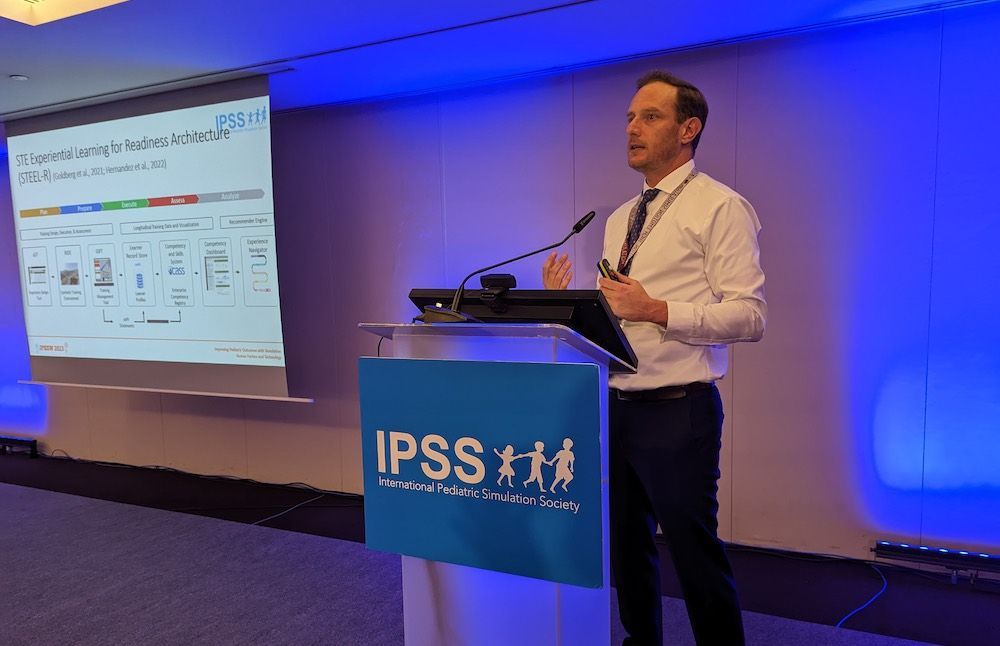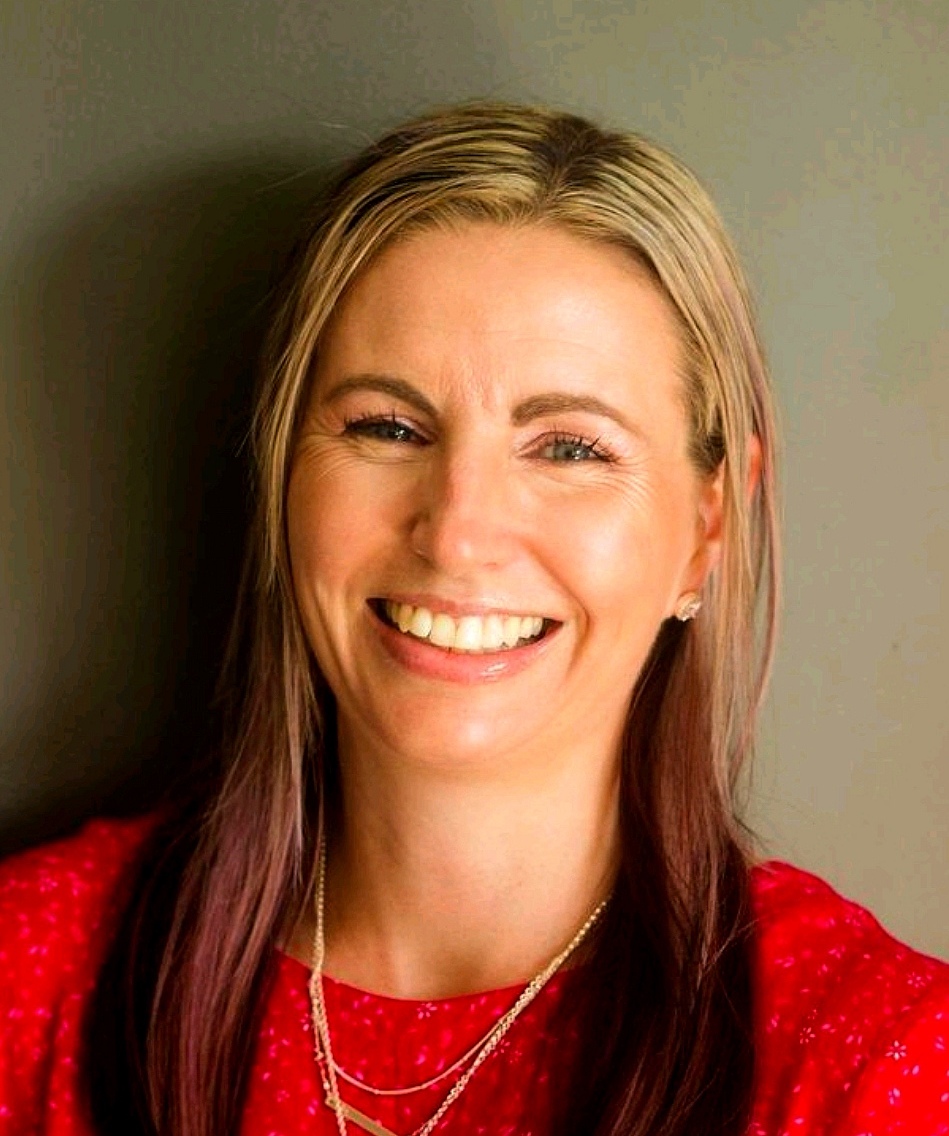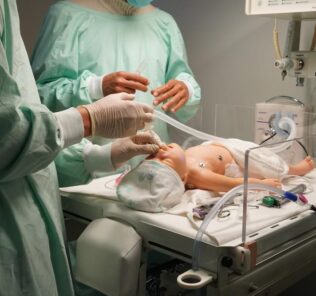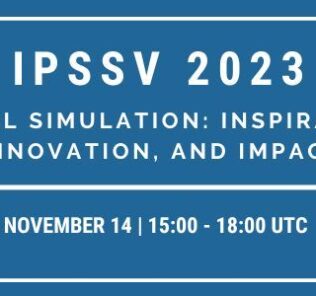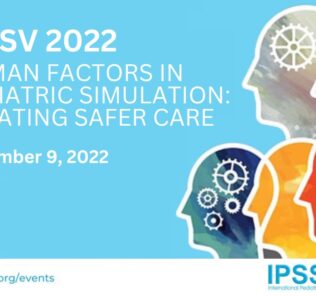Pediatric Simulation Conference IPSSW 2023 Opens in Lisbon
This week in Lisbon the Pediatric Simulation Organization IPSS opened its annual conference in Lisbon with attendees from all over the world. The International Pediatric Simulation Society (IPSS) was formed in 2008 by multinational pediatric medical practitioners from all over the world. Since then IPSS has expanded to become a large and extensive global community that includes over 30 countries for both membership and attendance to their annual IPSSW conference. HealthySimulation.com team members attended the event to cover the event, which switches location between North America and Europe each year!
IPSSW 2023 theme in Lisbon is “Improving Pediatric outcomes with Simulation: Human Factors and Technology”. The conference presents renowned world experts in pediatric and perinatal simulation to the largest global meet of pediatric simulation. IPSSW 2023 delivered multiple disciplines to explore pediatric and perinatal simulation in depth over three days. Discussions include how clinical simulation assists to provide safe and effective care for infants and children. IPSSW also continues to promote and motivate expansion on pediatric simulation across the globe. Renowned world leaders in pediatric and neonatal simulation attend IPSS annually to inspire and mentor others to provide world class healthcare simulation in their home countries. Network opportunities, partnership and equality is at the heart of IPSS vision and direction. Vendors and sponsors present included: SimX, Laerdal, HealthySimulation.com, iRIS, TruCorp, Immersive Design Systems, Gaumard, and PediEdTrics.
IPSS is a multi-professional society with the mission “to inspire, grow and lead the global Pediatric Simulation community”. Membership includes clinical disciplines such as Physicians, Nurses, Child life specialists, Advanced practice providers, Physician assistants, Nurse practitioners, Allied healthcare professionals, Educators,Psychologists, Researchers, Simulation specialists, Simulation technicians, Fellows, Residents, Respiratory therapists, Medical students and anyone with a passion for or involvement in pediatric simulation.
Sponsored Content:
The first keynote presentation was by Ben Goldberg (PhD), a senior scientist in the Adaptive and intelligent training systems (AITS) team under the U.S. Army. Ben presented an incredibly engaged, well attended and thought inspired talk on “Learning Engineering” within the U.S. Army simulation community. Ben’s talk took a deep dive into the process of how to design and deliver programs that adjust the end user’s mental model with the use of adaptive technologies.
View the IPSSW 2023 Opening Keynote Competency Based Experiential Learning and the Role of Simulation, Data and Learning Engineering by Dr. Goldberg on the HealthySimulation.com LEARN CE/CME Platform!
Ben discussed cognitive psychomotor scaffolds to design mixed reality simulation in the combat military environment. He then walked attendees through a complete process from education concept through to constant data driven after action reviews. Although the deep dive in the talk related to military combat simulation, Ben presented through an engineer’s lens of scalability and how the AITS program could be disseminated into the broader healthcare medical simulation community.
Continual data collation and reviews build and refine mental models for participants. Cognitive versus behavioral assessment through video and frame reference is related to movement data that is collected. 2D maps are created with computer visions and artificial intelligence which provide insights from the data. Data collated includes physical movement in the space, hold of a simulated weapon which produced laser bullet tracks as well as physical heart rate monitor of eye tracking, heart rate and respirations.
Sponsored Content:
Throughout Ben’s keynote the consistent reference to healthcare simulation and the scalability of the AITS program from military simulation to medical clinical simulation was evident. There was a lot of interest from pediatric simulation world leaders in the “Learning Engineer” program. The transferability of the program to healthcare simulation in the future was evident.
The day one keynote has set the tone for the IPSS conference of human factors and technology. Although technology leaps ahead continually, one focus remains clear: the human experience is central. The mood of the room was a buzz for the first keynote with 250 attendees from all over the world passionate about pediatric and perinatal simulation.
After the keynote there were multiple break out rooms with several shorter back to back ten minute oral presentations. Short presentations included topics such as virtual reality, escape rooms, pediatric outreach services and research studies completed on simulation based education. Other hot topics included how to train new leaders and de-escalation of aggressive behaviors in the workplace through modalities such as virtual reality. Break out rooms are grouped into themes such as: curriculum development and bootcamps, Jedi/global, CRM/team training and NICU.
After the short presentation breakout rooms poster presentations were delivered up until lunch time. IPSS attendees are then given the opportunity to visit the local CUF academic simulation center. 40 spots were offered for conference attendees to take a short bus trip to visit the local Lisbon simulation center.
The visit to the CUF simulation center started with a didactic presentation by Pedro Garcia the clinical director of the CUF simulation program in their simulation center auditorium. Pedro describes their style of simulation as a “simulation gymnasium” or a deliberative practice and continual education. Pedro described the foundations of a successful simulation program, their audiovisual capabilities and high fidelity simulator fleet. The CUF simulation program integrates and interacts with other areas throughout their institution. These include: clinical, education, research, innovation and quality and safety departments. After the presentation attendees on the tour were able to see the multi use rooms at the world class CUF simulation center. Attendees on the tour were impressed with CUF simulation center and its incredible facilities and hospitality given.
After lunch and the healthcare simulation center visit further poster presentations and then four hour long concurrent workshops were on offer for topics such as the opportunity to be a participant in a virtual escape room for a 4 year old with vomiting, using simulation to address implicit bias and racism, developing Immersive 360 video healthcare simulation programs for uncomfortable clinical experiences and simbox a train the trainer workshop for low cost clinical simulations. During the plenary session on Day 2 by Dr. Patrea Anderson, Professor and Academic Lead Centre of Health and Social Practice at Wintec Waikato Institute of Technology, the audience was reminded about the potential of clinical simulation to:
- Create learning environments that under normal circumstances would not be humanly possible.
- Improve education delivery to facilitate knowledge acquisition, understanding and retention.
- Bridge the theory practice gap by offering new ways to assist translation of theoretical concepts in practice.
Dr. Anderson shared a review of the past and present medical simulation technologies and methodologies available to pediatricians to improve clinical outcomes in education, training and patient safety, including the use of standardized patients, high-fidelity patient simulators, mixed reality headsets, task trainers, and virtual anatomy devices such as the CAVE. Patrea shared her journey of clinical simulation throughout her career which spanned from clinical experiences to her current role in the University of Sunshine Coast, Australia. The future of healthcare simulation was discussed at length and technology examples displayed. The main take home message was that just because a learner has experienced virtual immersive based healthcare education doesn’t mean an assumption can be made that the student has learnt the content. Despite technology making huge advances the human to human element of education still remains of high importance. The student must remain centric rather than the technology.
In the short talk sessions Shamreen Vora, Manu Madhok, Maria Diaz and Shruti Kant presented a highly interactive and immersive workshop on moving past the color of the manikin and how to deliver DEI healthcare simulation courses. The workshop participants got to experience and be debriefed on an experience of exclusion which was powerful. Participants were then divided into four groups and each got time in a small group with each facilitator. Each facilitator discussed DEI based clinical simulation courses they had designed and delivered in their institutions. To hear about how to design and deliver this education as well as lessons from these experts was incredibly well received and welcomed from clinical simulation experts in the field who wish to progress in the diversity, equity and inclusion education space across the globe in healthcare simulation.
Anna Zanin presented a study performed in Italy for “Rapid cycle deliberative practice” style of healthcare simulation which was adapted to practice in management of difficult conversations in the clinical setting. Anna walked attendees through a program that was designed, delivered and studied in her institution. Data shared showed that to learn communication skills through an RCDP lens with professional actors was useful for participants. RCDP shows promise for a methodology within the communication space of clinical simulation. Follow @IPSSOrg on Twitter for all the latest conference updates, and…
Learn More on the IPSS Website Today!
Erin Carn-Bennett is a Simulation Nurse Educator for the Douglas Starship Simulation Programme in Auckland, New Zealand. Carn-Bennett has her Masters of Nursing and has an extensive nursing career within pediatric emergency and also nursing management. She is passionate about debriefing and all things simulation. Carn-Bennett is a member of the IPSS board of directors. Carn-Bennett is the lead host of the podcast Sim Nurse NZ.
Sponsored Content:



